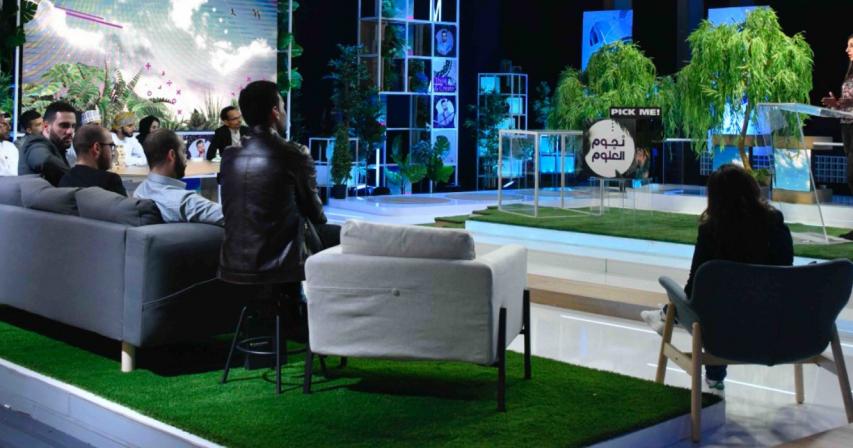QF’s Stars of Science Season 12 gets underway with spotlight on scientific tussles and distinctive ideas
- 4 years ago

Innovators from across the Arab world have begun their quest for success by finding solutions to challenges facing the Arab world.
It’s been an exciting start to the new season of Qatar Foundation’s innovation TV show – and viewers across the Arab world are sharing in the on-screen moments of innovation.
Thousands of applicants have made their bid to participate in Season 12 of Qatar Foundation’s Stars of Science, the first episode of which has been screened this weekend – but only the best can qualify.
Aiming to find solutions to challenges facing the Arab world – whether they are economic or social - many participants have already made it clear that they want to be part of the program because they believe that innovation is the way to a better future. And they include Palestinian inventor Jamal Shachtour, who waited two years before being able to present his idea on the Stars of Science stage.
His innovation aims to help injured people during conflicts or emergencies, and consists of an electronic breathing bag equipped with two masks – one for rescuers and the other for those who have been injured – and a watch with an aid to open the airway. And this idea has enabled him to qualify for the show’s second stage.
In an attempt to enable Syrian refugees to connect with their family members in their homeland, participant Shatha Hatem created the teddy bear Fatfoot, which transmits heartbeats, body temperature and touch between the two parties, through a sensor inside the doll. Meanwhile, Sudanese participant Fatima Zahra Abd al-Wahhab also presented a project to transform leather waste into organic fertilizers, and Radwan Bashwan, from Morocco, invented a headphone device to teach Arabic.
On top of this, projects ranging from enabling people to feel the benefit from vegetables and fruits in advanced technology were also showcased on the show’s opening episode.
But despite the diversity of their ideas, these participants were unable to convince the jury, who felt Stars of Science was not the right platform for their projects. And so, amid feelings of disappointment and shock, they left the program – meaning it was down to others make their way towards Stars of Science stardom.
In the opening casting episode, Muhammad Mortada from Lebanon presented his idea, a bicycle that helps riders to climb upwards easily. It didn’t convince jurors Dr. Khalid Al-Ali and Professor Fouad Mrad – but, for Professor Mrad, it did take him on a trip into the past. He recalled his mother watching him smiling as a nine-year-old while, out of curiosity, he fiddled with the pedal sewing machine, trying to explore how it worked.
However, the episode did see a number of innovators qualify for the next stage, and among them was Sarah Hassan from Lebanon, who has discovered promising genes for stimulating cells in order to accurately predict the extent of a medicine’s effectiveness. Sajida Matar from Jordan has created a scientific solution for users of a portable sprayer, and Walid Noman presented his idea for a robot that runs on uneven surfaces and can be controlled remotely, to help people with special needs.
Abeer Al-Bashiti, from Jordan, showcased her idea for a bracelet that includes a set of biosensors that provide ways for a person to improve mood, and help reduce their stress. And despite voicing her concerns about coming face-to-face with Professor Mrad, Razan Al-Kalbani from Oman managed to convince him and the rest of the jury of the promise of her project, a composite coating of lycopene that is used as a high-quality shield to absorb harmful rays.
Joining regular Stars of Science presenter Khalid Al Jumaily was guest Rooda Al Qebaisi, a participant in Season 10 of the show. She emphasized the importance of self-confidence and belief in a project to overcoming all barriers to innovation, explaining that her invention, the Dynamic VIP Seating Manager, has reached the final stages of implementation and secured financing.
As for the participants’ impression of the judges,, the new season’s first episode ended with Professor Abdelhamid El-Zoheiry being dubbed "Ambassador of Tenderness", as they revealed how his “sensitive” personality makes their mission to face the jury less daunting. Satisfying Professor Mrad was described as more difficult, due to his precise scientific questions, while others chose Dr. Al-Ali as their favorite for his approach to critiquing their projects.
And it seems as if this difference in personalities was the reason for the light-hearted clashes that took place between Professor El-Zoheiry and Professor Mrad throughout the episode, the last of which was a bike-riding challenge that ended a long day of scientific tussles. The battle between the two jury members ended unresolved, which suggests it could continue into the following episodes.
Next week’s episode will see the second round of qualifiers unfold, as a new season of the Arab world’s top innovation show unfolds – filled with suspense and capturing the curiosity of viewers across the Arab world.
A full broadcast guide can be viewed at
www.starsofscience.com
*All images show elements of Stars of Science Season 12 that were filmed before physical distancing measures were introduced due to COVID-19.
Comments